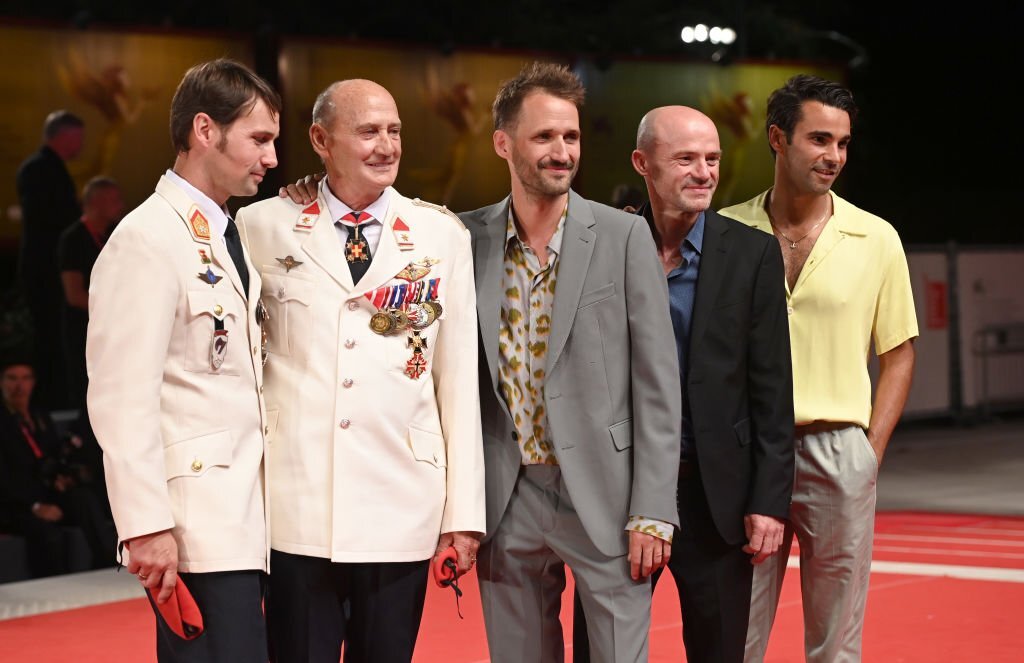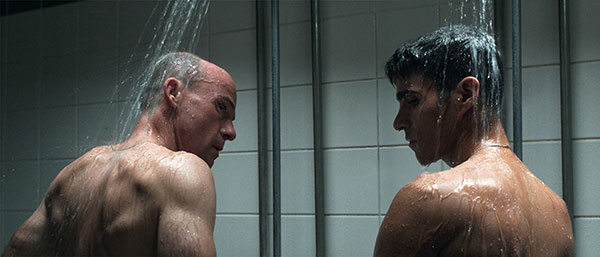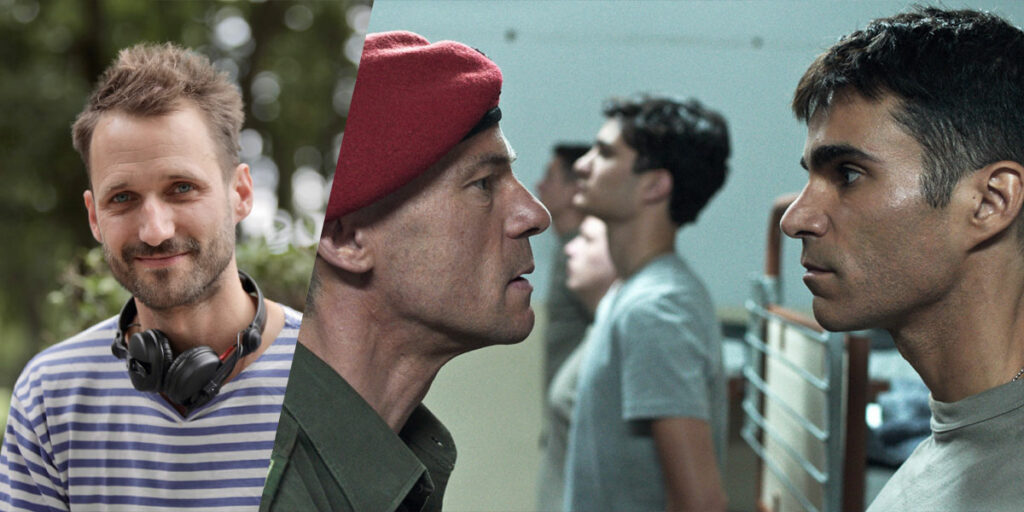In this Venice Film Festival interview, we speak with director David Wagner about his poignant movie Eismayer, telling the true story of a sergeant who falls in love with a recruit.
Venezia 79’s International Critics Week has given us some of the best films of the festival this year, and one of those movies is David Wagner ‘s Eismayer, telling the true story of a feared Austrian Armed Forces instructor who falls in love with an openly gay recruit. The instructor in question is Sergeant Major Charles Eismayer (Gerhard Liebmann, of Murder: Anatomy of a Trial), and the film shows us the development of a relationship with the provocative Mario Falak (Luka Dimić, of Zima), which eventually leads us to realise that Eismayer is also gay – only, he’s been keeping that a secret for his entire life, repressing his true self to present a picture of “masculine man” that society would accept.
The film tells a story that is more relevant than ever and absolutely deserves to be told, and it’s not just a beautiful tale about embracing one’s self, but also an enjoyable, wonderfully ironic and often surprising film that will have your eyes glued to the screen. In the occasion of Eismayer ‘s premiere at the 2022 Venice Film Festival, we spoke with director David Wagner: read the interview and find out about bringing this true story to the big screen, casting its protagonists, showing the film to audiences, and how, in the end, it’s all about love.

Eismayer ‘s Venice Premiere
Congratulations for Eismayer ‘s premiere! I love that, when we posted our list of films to watch at the festival, you sent us a message to say that it made you realise that this was happening!
David Wagner: You know, when you make a movie for the first time, you know that there are many good festivals, but that Venice is a big thing. But in your article, Eismayer was suddenly in a list of 20 films to watch at the festival, next to Darren Aronofsky or something like that: for me, that was like, “holy sh*t, now I get it!”. And I got really nervous and excited. [laughs]
Was it like to have the show the film to an audience here at the festival?
D.W.: Imagine you’ve been dreaming of making a feature film for… I think for me it was 20 years. And then, you work for four years on a movie, and it’s really tough. It’s a lot of pain, tears, sweat, and also joy! And then there’s a festival like Venice, allowing you to show it, and the main characters are there too: it was so big, I can’t really describe how that feels. I felt like I was exploding.
The real Charles Eismayer and Mario Falak were also at the premiere, weren’t they?
D.W.: Exactly! For me, this was the most amazing thing about it: my inspiration, and the characters which I based the story upon, were there. They saw their love story on the screen in Venice, and this was so emotional! I was so touched, it was amazing.
David Wagner on Telling Charles Eismayer ‘s Story
How did you decide that you were going to tell this particular story?
David Wagner: I never met Charles Eismayer when I was at the army, but I heard all the terrible stories about him: I was really afraid of this guy. And then, I read in a newspaper article that he got married to another man, and I became so interested in this person, because it didn’t match my understanding of who he was. So I somehow managed, through connections, to get to him directly, and he just invited me to his home, you know? He cooked for me, and he wanted to check me out: he knew from the beginning that I was interested in the story, and that I wanted to make a movie about it, but he had to understand if he could trust me. And in the end he did: he said, “You know what, I’m gonna tell you everything. But you have to make a really good movie.” I said I’d try, and then I got to know this whole story, from his adult self until they got married: I was so amazed by the depth and the details of a story I had never heard before. This was the moment when I realised that this had to happen.
It’s so interesting that he told you his life story, because in Eismayer we don’t find out about his childhood till halfway through the film, and I found that very effective!
D.W.: For me, it was clear that I didn’t want to make a story about an outing, you know? Like, “Surprise: he’s gay!” No, it’s much more interesting to see a person who lives a completely different life against their own will, and against their own nature, actually. There’s so much conflict in this, and this also explains why he was this kind of really fierce instructor. He tried to hide his gay personality really, really hard, because he had to survive within the Army. And there’s so much toxic masculinity going on there, especially when he was in the army, that, as a gay person, he wouldn’t have survived. They would have just bullied him so much, and he would have eventually done something else. But he really wanted to be a soldier, because he is a soldier.
So it’s kind of interesting how he managed to have this kind of double life. I wanted to watch him be confronted by another person, Mario, who actually shows him that he can also be a gay person, and that’s okay. He doesn’t have to be afraid of it. And then he gets into this kind of conflict, where it’s like, “I hate this guy, but I love this guy”. For me, this was much more interesting than making a story about an outing.

Showing Acceptance in Eismayer
I love how you gave us an example of a soldier, Mario Falak, who’s not only openly gay but also accepted by his comrades.
David Wagner: Yes. That’s also something I wanted to have in my movie: there’s not only the old school homophobic world in it, but there’s also a perspective into a future I wanted to see – the newer generation is more open and accepting. There’s this kind of transition between the generations in the movie, and how people react to homosexual people. It was very important for me to have some younger guys who were already more accepting.
That’s so true! I love that Eismayer ‘s superior, Sergeant Karnaval, makes it clear that he doesn’t approve of his methods. It’s so refreshing to see!
D.W.: Yeah, that’s exactly it. I like this actor [Christopher Schärf] very much: he’s a friend of mine. I felt like it would be really interesting if Eismayer ‘s superior was already from next generation, and also confronted him on a professional level. He also confronts him with his homophobic behavior, and this makes Eismayer reflect about how he’s actually working against himself with this kind of toxic masculinity.
The character of Eismayer’s son [Lion Tatzber] is also so important in the film. To me, it feels like Eismayer himself only realises that it’s ok to be who he is when he sees that his own son, who’s a child, doesn’t make a big deal out of the fact that he likes men.
D.W.: Yeah, that’s exactly what I wanted to achieve with this. If you watch the world through the eyes of a kid, and you are not biased by our society and everything that comes with it, then it’s all about love, actually. It’s universal. This scene was very tricky to achieve, because it was a kid talking about love, but it was important that it didn’t go into a kind of sexual direction. It was really just really about accepting that you can love anybody. And so I had to find the right words, like, “I like boys better than than girls,” and all of that: it was really a fine tuning kind of thing, to find out what worked best.
This was also a chance to like to get rid of all the biases and structures, like the military, men and women, and toxic masculinity. It really comes back to just love and acceptance: I do what I want, and there’s nothing to judge there. And that’s what you see in the eyes of the kid.
Lion Tatzber is so good in the film!
D.W.: Yeah, I love him! He’s going to be… No, actually, he already is a really good actor.
Bringing the Story to the Big Screen
Did you add anything to the story or did it all happen?
David Wagner: I added quite a lot. For example, every scene that’s shot in the mountains, the whole river thing, and also when he takes the car and goes after Mario in the end. You know, this was my first movie: I wanted to see action and to do something that was fun, so I played around with it. But I still always thought about the core of the story, and how that could be translated into a movie. I think 40% of it is more or less real, and 60% is fiction, to deliver the story in a faster way: it’s such a big story and it was so tricky to get it into 90 minutes.
I love that there’s a lot of irony in the film. This was such an effortless watch, and not at all what I expected from just reading the synopsis!
D.W.: Yeah, I think it’s an Austrian thing. There’s this kind of strange humor in Austria we all grow up with. We always have to make fun of stuff a little bit – not too much: even if a film is dramatic, there’s also a weird joke that comes at some point. And you obviously have this in the Army as well.
How was it showing it to an international audience? Did they laugh when you expected them to?
D.W.: I was actually surprised that it was working so well! In Austria, the humour works because I knew how people would receive it, and also because the language I used is very specific. Bu yesterday, when we were screening it to an international audience, people were laughing at exactly the right moment, so they totally got it. They even laughed more than I expected: the screening was just great. Everything was bigger.

David Wagner on Casting Gerhard Liebmann & Luka Dimic
How did you choose your cast?
David Wagner: I developed everything around my main character. The first thing was for me to find the right guy to play Eismayer. When I watched Gerhard Liebmann’s demo reels, I was actually really ashamed that I didn’t already know this guy, because he was in so many movies but he never had a really big role. And I watched him play different kinds of roles and he was always the best actor in every scene. He also physically matched my Eismayer, so I decided that I needed this guy. I had a script already, and I sent it to him: he read it, and he was in.
Then, I had to find a guy who could be his love interest: there had to be real chemistry between them. It was very tricky to find the right person. When I invited Luca, and had him and Gerhard rehearse together, you know, there’s something you cannot really put the finger on, but it’s just there. When they met, I realized that I didn’t have to do anything: I knew they were feeling something, and I could see how transportive that was. There was a connection, and I needed to tell a love story between them, so I just cast both.
What’s Next for David Wagner
What are your future projects?
David Wagner: It’s a good question, and a tough one for me. Right now, I want to enjoy going out there and seeing all the responses to the movie, taking in the feedback and seeing what it does to me. I also want to have some time to reflect on what to do next: I have some themes and topics that are really important to me. For example, what really concerns me is this kind of split of society that we can see everywhere: it’s getting more extreme. The nationalist, conservative kind of society and the more liberal one and really splitting up, I’d like to find something in-between, that can pull society together. It’s a really big thought, but it’s something that concerns me.
I would really love to see a movie about polyamorous love, because I haven’t seen one before that I think really reflects on everything that comes with it. I think it’s a very interesting topic that a lot of people are thinking about, but nobody really knows how to handle and approach.
Please do it! I haven’t seen many good films about this topic!
D.W.: Yeah, there are a lot of clichés when it comes to this, and, in the end, we always come back to how it’s not working, and it’s better if we have this kind of “Disney” happy ending, where you just have to find the right person and then you’ll be happy forever. And it’s annoying, and really toxic, actually, because it doesn’t make us happy.
This interview has been edited for length and clarity.
Eismayer premiered at the 2022 Venice Film Festival on September 4, 2022, as part of the International Critics Week, and will be released in Austria in October.

